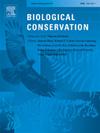Making conservation more inclusive is a realization of our land ethic
IF 4.4
1区 环境科学与生态学
Q1 BIODIVERSITY CONSERVATION
引用次数: 0
Abstract
Aldo Leopold's essay The Land Ethic is a cornerstone of North American conservation science. It is celebrated for its emphasis on the interconnectedness of ecosystems and the moral imperative to respect this interdependence. Yet, at its core, Leopold's essay is a call for change, asserting that societal values - on which our relationship with land is predicated - evolve over time. Here, we revisit Leopold's call in light of contemporary conservation challenges and the growing recognition of the importance of equity and social justice in environmental stewardship. We highlight the limitations of a static interpretation of Leopold's Land Ethic, noting its minimal acknowledgment of Indigenous stewardship and its historical context within hegemonic cultural values. We examine how modern environmental issues, such as globalization, urbanization, and climate change, demand an evolving ethical framework. Ultimately, we argue that Leopold's plea to expand our ethical community is consistent with ongoing efforts to incorporate diverse perspectives and rectify historical injustices in conservation. Further, we pose a series of questions with the goal of stimulating conversations on what reimagined land ethics centered on equity, justice, and inclusivity could offer. Together, these questions provide a framework for critical self-reflection and group discussion on how we can continue to answer Leopold's call in the face of modern conservation challenges.
使保护更具包容性是我们土地伦理的实现
奥尔多·利奥波德的论文《土地伦理》是北美自然保护科学的基石。它以强调生态系统的相互联系和尊重这种相互依存的道德必要性而闻名。然而,利奥波德文章的核心是呼吁变革,主张社会价值观——我们与土地关系的基础——随着时间的推移而演变。在这里,我们重新审视利奥波德的呼吁,考虑到当代的保护挑战,以及越来越多的人认识到环境管理中公平和社会正义的重要性。我们强调了对利奥波德土地伦理的静态解释的局限性,注意到它对土著管理及其在霸权文化价值观中的历史背景的最小承认。我们研究了现代环境问题,如全球化、城市化和气候变化,如何要求一个不断发展的道德框架。最后,我们认为,利奥波德呼吁扩大我们的道德共同体,这与目前正在进行的努力是一致的,即纳入不同的观点,纠正保护中的历史不公正。此外,我们提出了一系列问题,目的是激发以公平、正义和包容性为中心的重新构想的土地伦理可以提供的对话。总之,这些问题为批判性的自我反思和小组讨论提供了一个框架,讨论我们如何在面对现代保护挑战时继续回应利奥波德的呼吁。
本文章由计算机程序翻译,如有差异,请以英文原文为准。
求助全文
约1分钟内获得全文
求助全文
来源期刊

Biological Conservation
环境科学-环境科学
CiteScore
10.20
自引率
3.40%
发文量
295
审稿时长
61 days
期刊介绍:
Biological Conservation is an international leading journal in the discipline of conservation biology. The journal publishes articles spanning a diverse range of fields that contribute to the biological, sociological, and economic dimensions of conservation and natural resource management. The primary aim of Biological Conservation is the publication of high-quality papers that advance the science and practice of conservation, or which demonstrate the application of conservation principles for natural resource management and policy. Therefore it will be of interest to a broad international readership.
 求助内容:
求助内容: 应助结果提醒方式:
应助结果提醒方式:


